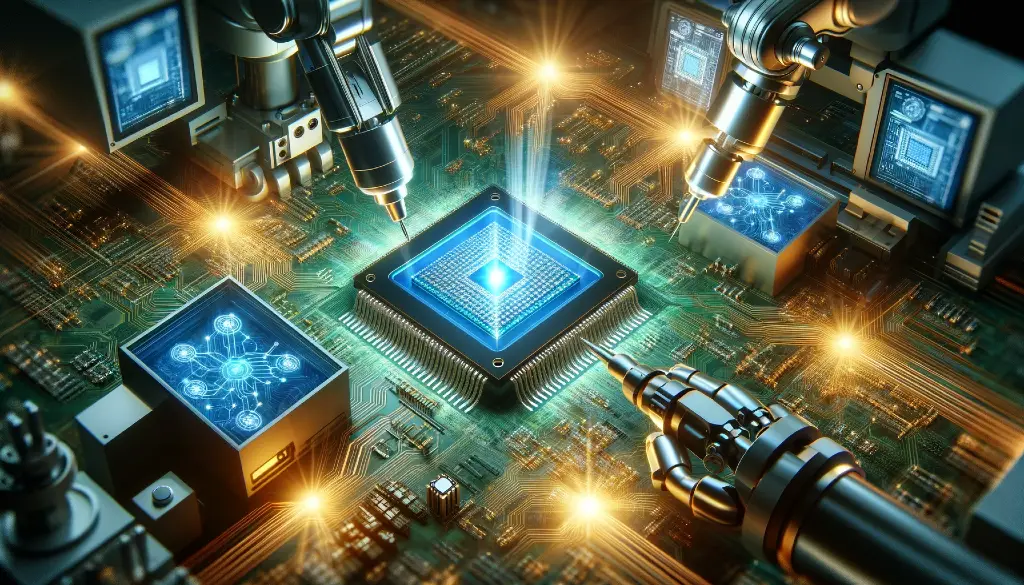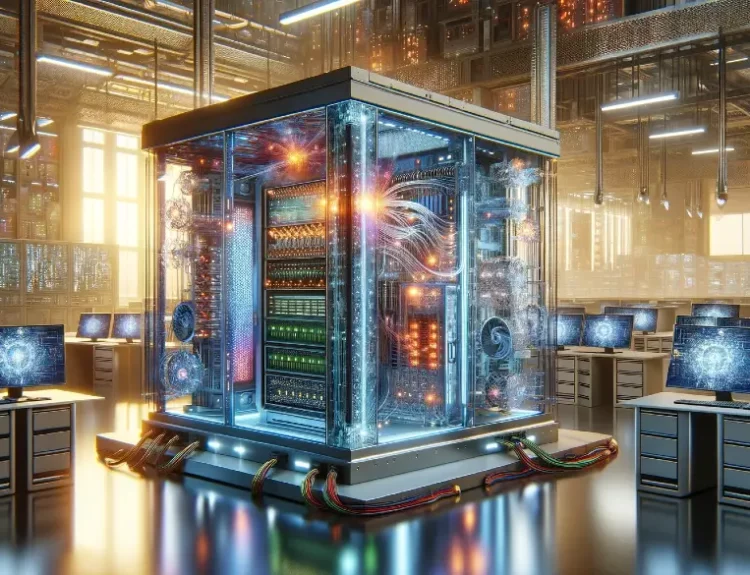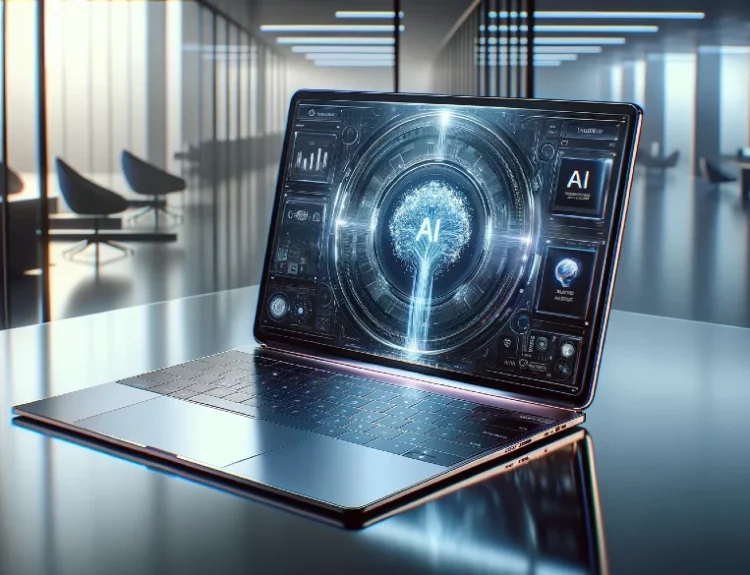Introduction
The insatiable demand for faster, more powerful computer chips fuels the ever-evolving world of technology. From smartphones and laptops to self-driving cars and complex medical devices, our reliance on these tiny marvels continues to grow. However, the semiconductor industry, responsible for designing and manufacturing these chips, faces a constant struggle: keeping pace with this ever-increasing demand while maintaining efficiency and cost-effectiveness.
This is where Artificial Intelligence (AI) steps in as a game-changer. AI, with its ability to learn, analyze vast amounts of data, and make complex decisions, is rapidly transforming the chip manufacturing landscape. From optimizing chip design to streamlining production processes, AI offers a powerful tool to overcome current challenges and usher in a new era of innovation in the semiconductor industry.
The Rise of AI in Chip Manufacturing
The traditional players in the chip manufacturing industry are facing a new breed of competitors: AI computer chip makers. These companies leverage the power of AI to design and manufacture chips in a fundamentally different way (AI computer chip makers). Unlike traditional methods that rely heavily on human expertise and experience, AI computer chip makers utilize sophisticated algorithms to automate tasks, analyze vast datasets, and optimize every step of the process.
This rise of AI in the semiconductor industry isn’t a singular application, but rather a multi-pronged approach. Here are some key areas where AI is making significant waves:
- AI-driven chip fabrication : AI algorithms are being used to analyze complex fabrication processes, identify potential bottlenecks, and predict equipment failures. This proactive approach allows for real-time adjustments and optimizations, leading to increased production efficiency and reduced downtime.
- Optimizing chip production with AI algorithms: Every stage of chip production, from lithography to etching, can be optimized with the help of AI. These algorithms analyze vast amounts of data to identify optimal settings for machinery, material usage, and process parameters. This not only improves production yield (the number of good chips produced per wafer) but also reduces waste and lowers overall production costs.
- Developing intelligent chip-making solutions: AI is being employed to design and develop next-generation chip-making solutions. By analyzing historical data and current trends, AI can suggest innovative chip architectures and materials that cater to specific needs, such as higher performance or lower power consumption. This fosters a more agile and data-driven approach to chip development.
The adoption of AI in chip manufacturing is still in its early stages, but the potential for growth is undeniable. As AI technology continues to evolve and mature, we can expect even more groundbreaking applications to emerge, paving the way for a brighter future for the semiconductor industry.
Benefits of AI in Chip Production
The integration of AI into chip manufacturing is not just a futuristic vision – it’s already delivering tangible benefits that are revolutionizing the industry. Here’s how AI is enhancing efficiency and propelling the semiconductor industry forward:
1. Reduced Production Costs:
- Traditional chip manufacturing involves a delicate balance between yield and material usage. AI algorithms excel at analyzing complex data sets, allowing them to identify optimal settings for machinery and materials. This translates to minimized material waste and a significant reduction in overall production costs.
2. Improved Chip Quality and Yield:
- By constantly monitoring production processes and identifying potential issues before they occur, AI helps to ensure consistent chip quality. This proactive approach minimizes the number of defective chips, ultimately leading to higher yield rates – the number of good chips produced per wafer.
3. Accelerated Time-to-Market:
- The traditional chip design and manufacturing process can be time-consuming and iterative. AI algorithms can automate repetitive tasks, analyze vast design spaces, and suggest optimal configurations. This streamlines the entire process, allowing chipmakers to get their products to market faster.
4. Developing Advanced Chip Designs:
- Human engineers are undoubtedly brilliant, but AI brings a unique perspective to chip design. By analyzing vast datasets of past designs and performance metrics, AI can suggest innovative solutions that push the boundaries of performance and efficiency . This fosters the creation of advanced chip designs that cater to the ever-increasing demands of modern technology.
In essence, AI is acting as a powerful partner to chipmakers, optimizing processes, improving quality, and accelerating innovation. These benefits not only translate to a more competitive semiconductor industry but also pave the way for the development of even more sophisticated technologies in the future.
The Future of AI in Semiconductor Manufacturing
The future of AI in semiconductor manufacturing is brimming with possibilities and holds the potential to revolutionize the industry even further. Here’s a glimpse into what lies ahead:
1. Emergence of Advanced AI Systems:
We can expect to see the development of even more sophisticated AI systems specifically designed for chipmakers . These systems will boast enhanced capabilities for:
- Predictive Maintenance: AI will move beyond identifying potential issues to proactively predicting equipment failures with greater accuracy. This will allow for preventative maintenance, minimizing downtime and ensuring smooth production flow.
- Self-Optimizing Processes: AI-powered systems will not only analyze data but also make real-time adjustments to production processes. This will create a self-optimizing environment, constantly striving for peak efficiency and performance.
- Custom Chip Design: AI will become adept at designing customized chips based on specific needs and applications. This will empower companies to develop unique solutions for emerging technologies like artificial intelligence and the Internet of Things (IoT).
2. Potential Challenges and Considerations:
While the future of AI in chip manufacturing is bright, there are also potential challenges to consider. These include:
- Ethical Considerations: As AI becomes more deeply integrated into chip design and manufacturing, ethical considerations around bias and explainability will need to be addressed.
- Data Security: The success of AI heavily relies on vast amounts of data. Ensuring the security and integrity of this data will be crucial.
- Human-AI Collaboration: AI is not meant to replace human expertise. Instead, the future lies in fostering a collaborative environment where humans and AI work together to achieve optimal results.
By acknowledging these challenges and proactively working towards solutions, the semiconductor industry can ensure that AI is harnessed responsibly and ethically for the betterment of the future.
Conclusion
The integration of AI into chip manufacturing is not simply a trend, but a transformative force shaping the future of the semiconductor industry. From streamlining production to fostering innovation, AI’s impact is undeniable. As AI technology continues to evolve, we can expect even more groundbreaking applications to emerge, pushing the boundaries of what’s possible.
Ready to join the future of chipmaking?
At Verdict, we believe in the transformative power of AI, not just in chip manufacturing, but across all industries . Our cutting-edge AI platform leverages the power of collective intelligence to accelerate innovation and unlock the true potential of AI. By harnessing the combined knowledge of our community, we’re building a future where AI works for everyone. Explore how Verdict AI can empower your chip design and manufacturing processes. Visit our website to learn more.
Looking for more insights on the future of technology?
Our blog page is a treasure trove of informative and engaging articles (check out our blog page for more interesting blogs…). Dive deeper into topics like “AI’s Impact on Computer Architecture” and “The Role of AI in Computer Organization” to discover how AI is transforming the world around us.
Stay tuned for more exciting content as we explore the ever-evolving landscape of AI and its impact on various industries.










